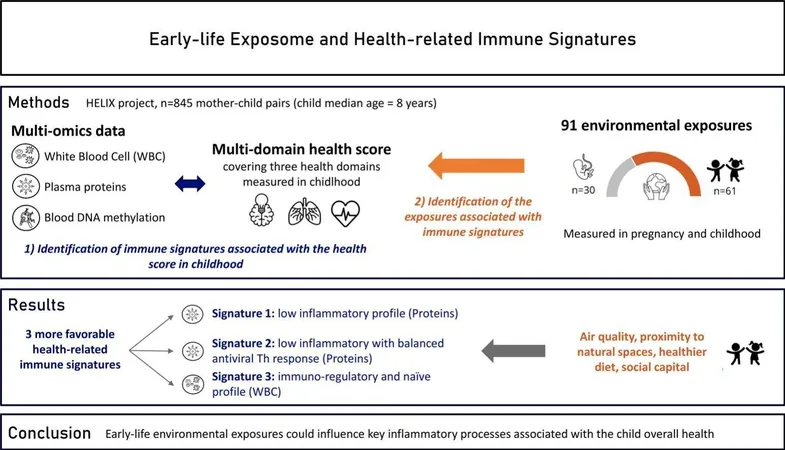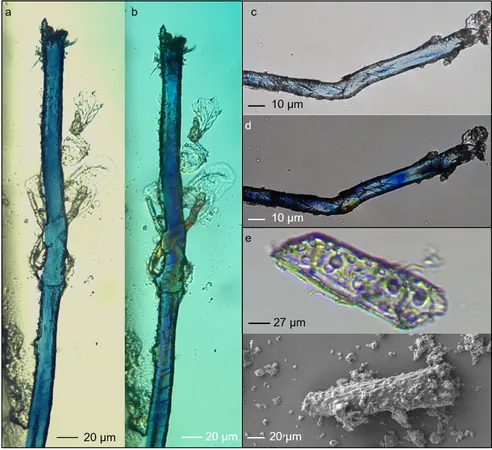
Transform Your Child’s Health: The Secret Link Between Environment and Inflammation Revealed!
2025-09-05
Author: Nur
What if I told you that the environment your child grows up in could significantly shape their health for years to come? Recent research has unveiled groundbreaking insights into how clean air, natural surroundings, nutritious meals, and strong social connections can drastically reduce inflammation in children, a key factor in chronic diseases like obesity, diabetes, and respiratory disorders.
A collaborative study from the Barcelona Institute for Global Health (ISGlobal) and INSERM—Université Grenoble Alpes has shown that children exposed to better indoor air quality, green spaces, healthy diets, and supportive communities experience less inflammation and improved immune function. These findings, published in the journal Environment International, emphasize the profound impact of early life environments on long-term health outcomes.
The research is part of the Human Early Life Exposome (HELIX) cohort within the ATHLETE project, studying 845 children from diverse backgrounds across six countries: the UK, France, Spain, Lithuania, Norway, and Greece. This unique range allows for a comprehensive look into how various environmental factors intertwine.
Léa Maitre, coordinator of the Exposome Hub at ISGlobal, explains, "Our study scrutinized a myriad of prenatal and postnatal environmental influences to uncover their effects on children's immune health and its relationship to broader health issues like cardiometabolic disorders and neurodevelopmental challenges."
Diving deeper, researchers analyzed 91 different environmental exposures, categorizing them into 13 groups—ranging from outdoor air pollution to indoor household toxins, and even social indicators such as parental education and income. Each aspect plays a vital role in shaping a child's immune landscape.
To gauge immune health accurately, scientists examined blood samples, focusing on white blood cell composition, plasma proteins, and DNA methylation patterns. By employing sophisticated statistical techniques, they identified immune "signatures" linked to higher health scores across respiratory, metabolic, and cognitive assessments.
The results were illuminating: three distinct immune signatures corresponded with healthier outcomes. Two were characterized by lower inflammation, while the third indicated a well-regulated immune response. What linked these advantageous immune profiles? A confluence of factors including superior indoor air quality, access to blue spaces, balanced diets, and robust social networks.
In summary, the study sheds light on the crucial role parents and communities play in a child’s developmental health journey. By fostering cleaner environments, promoting healthier lifestyles, and nurturing social bonds, we may pave the way for a healthier, stronger future generation!


 Brasil (PT)
Brasil (PT)
 Canada (EN)
Canada (EN)
 Chile (ES)
Chile (ES)
 Česko (CS)
Česko (CS)
 대한민국 (KO)
대한민국 (KO)
 España (ES)
España (ES)
 France (FR)
France (FR)
 Hong Kong (EN)
Hong Kong (EN)
 Italia (IT)
Italia (IT)
 日本 (JA)
日本 (JA)
 Magyarország (HU)
Magyarország (HU)
 Norge (NO)
Norge (NO)
 Polska (PL)
Polska (PL)
 Schweiz (DE)
Schweiz (DE)
 Singapore (EN)
Singapore (EN)
 Sverige (SV)
Sverige (SV)
 Suomi (FI)
Suomi (FI)
 Türkiye (TR)
Türkiye (TR)
 الإمارات العربية المتحدة (AR)
الإمارات العربية المتحدة (AR)